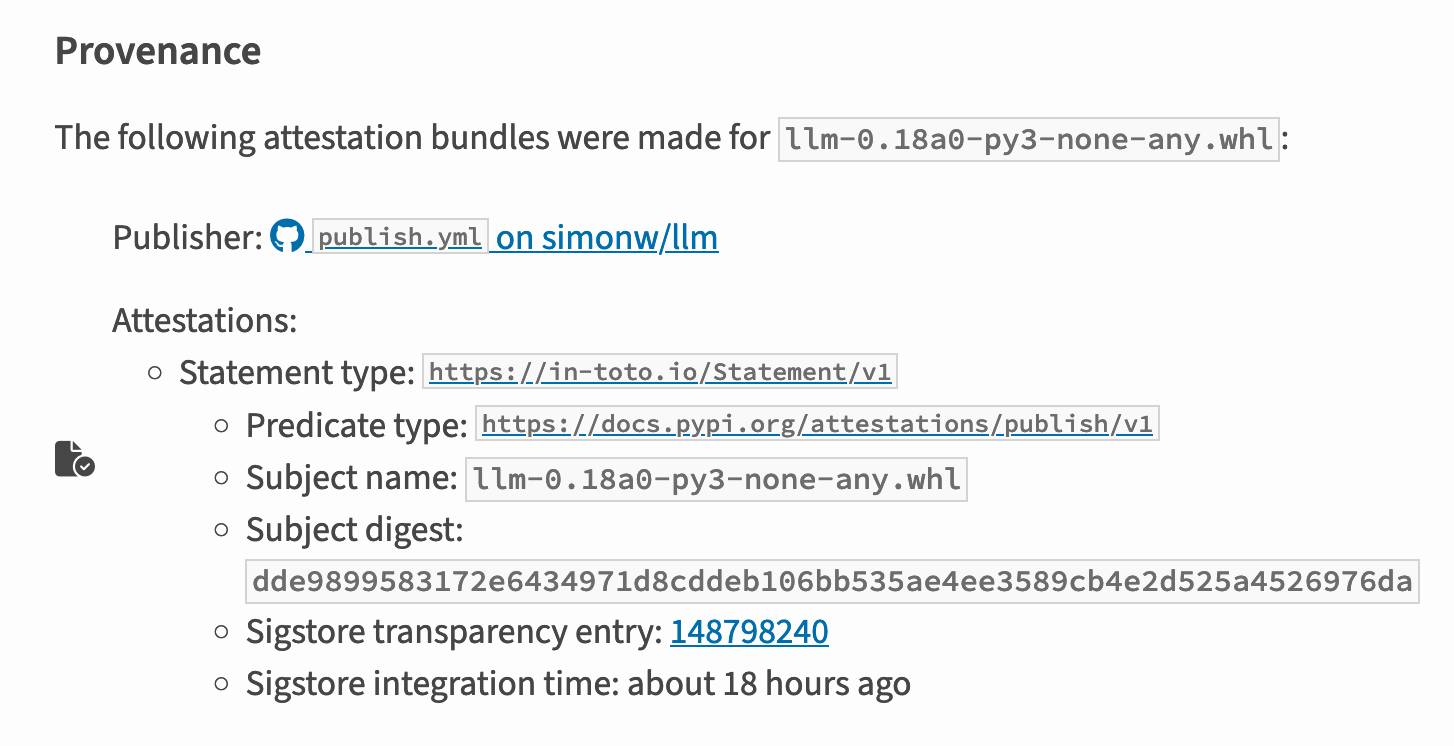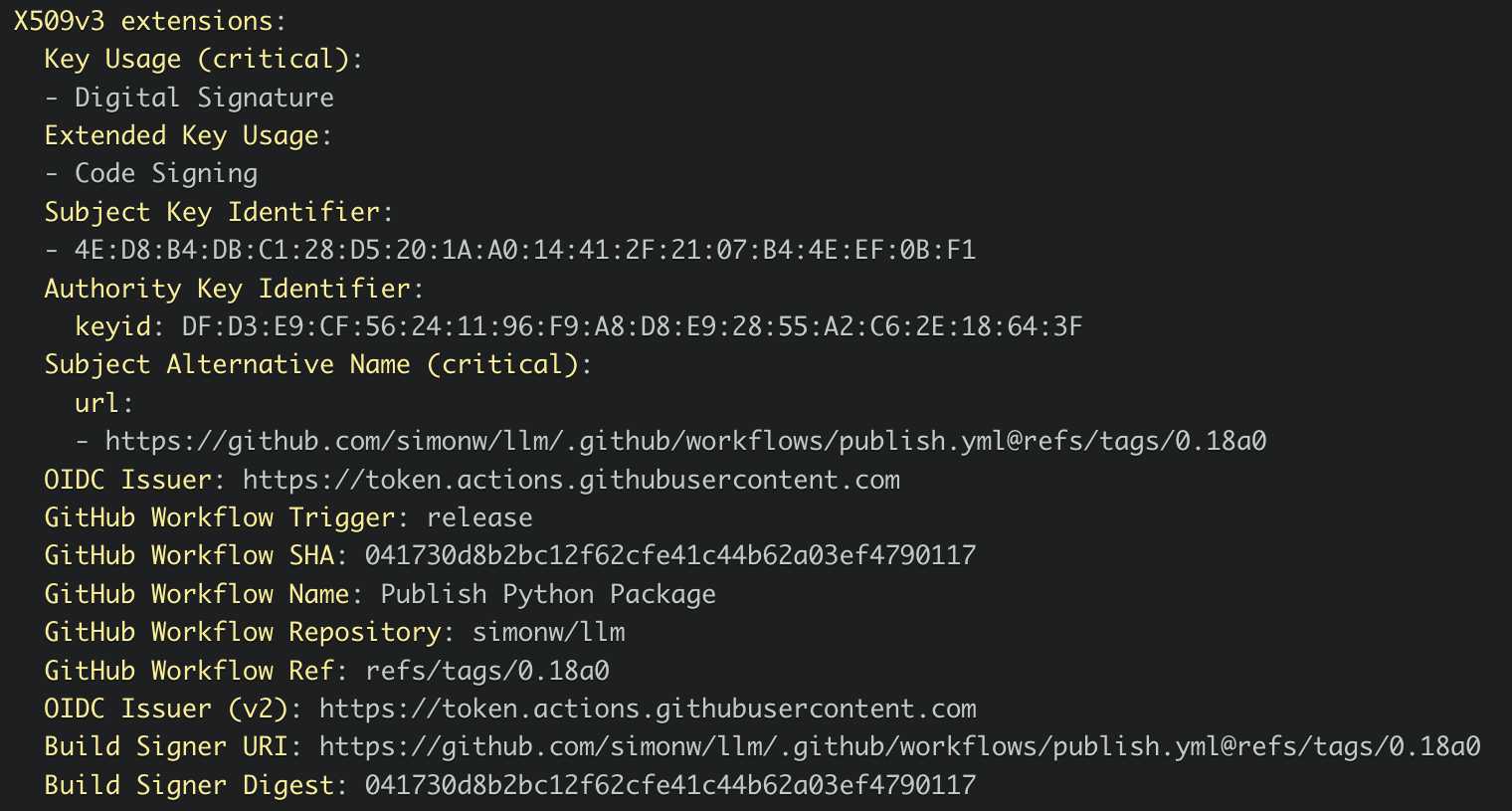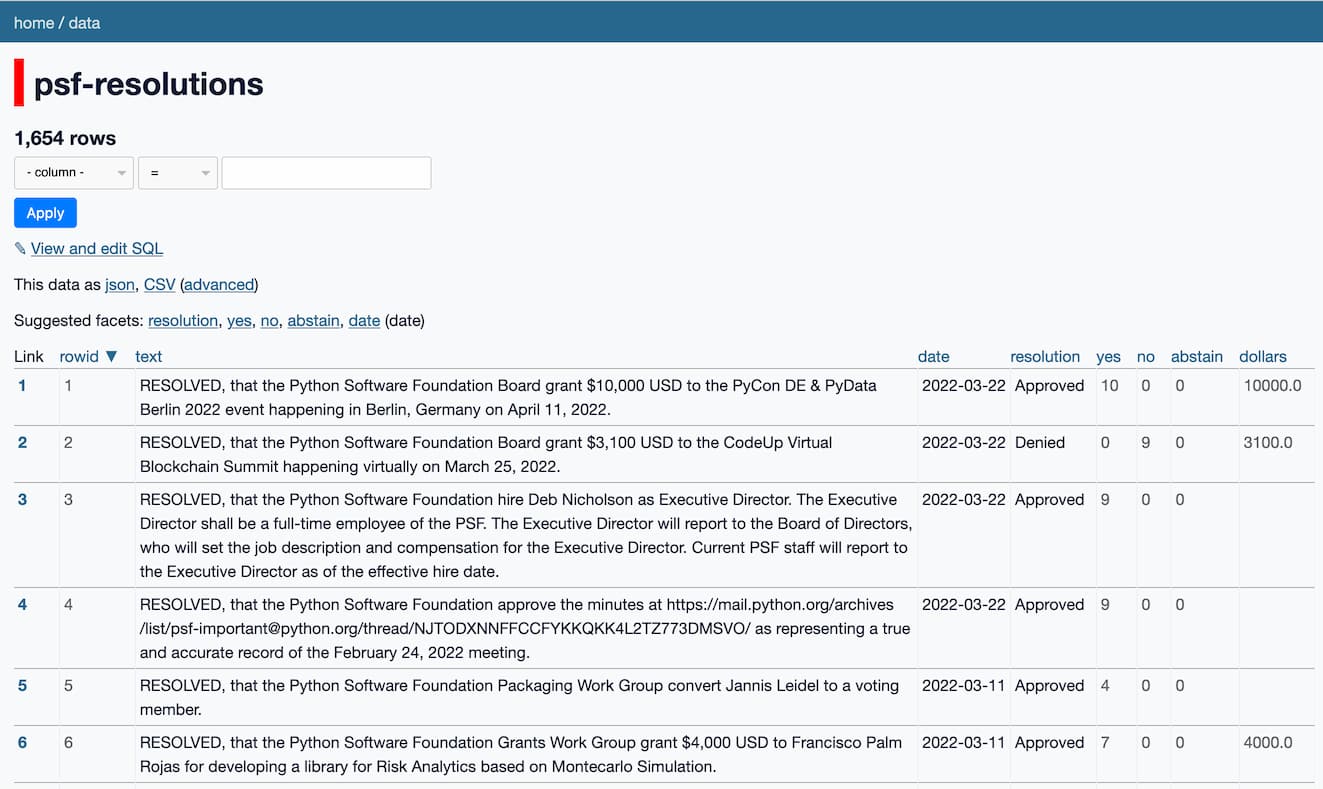20 posts tagged “psf”
The Python Software Foundation is the non-profit organization devoted to advancing open source technology related to the Python programming language.
2026
Anthropic invests $1.5 million in the Python Software Foundation and open source security. This is outstanding news, especially given our decision to withdraw from that NSF grant application back in October.
We are thrilled to announce that Anthropic has entered into a two-year partnership with the Python Software Foundation (PSF) to contribute a landmark total of $1.5 million to support the foundation’s work, with an emphasis on Python ecosystem security. This investment will enable the PSF to make crucial security advances to CPython and the Python Package Index (PyPI) benefiting all users, and it will also sustain the foundation’s core work supporting the Python language, ecosystem, and global community.
Note that while security is a focus these funds will also support other aspects of the PSF's work:
Anthropic’s support will also go towards the PSF’s core work, including the Developer in Residence program driving contributions to CPython, community support through grants and other programs, running core infrastructure such as PyPI, and more.
2025
PyCon US 2026 call for proposals is now open (via) PyCon US is coming to the US west coast! 2026 and 2027 will both be held in Long Beach, California - the 2026 conference is set for May 13th-19th next year.
The call for proposals just opened. Since we'll be in LA County I'd love to see talks about Python in the entertainment industry - if you know someone who could present on that topic please make sure they know about the CFP!
The deadline for submissions is December 19th 2025. There are two new tracks this year:
PyCon US is introducing two dedicated Talk tracks to the schedule this year, "The Future of AI with Python" and "Trailblazing Python Security". For more information and how to submit your proposal, visit this page.
Now is also a great time to consider sponsoring PyCon - here's the sponsorship prospectus.
The PSF has withdrawn a $1.5 million proposal to US government grant program. The Python Software Foundation was recently "recommended for funding" (NSF terminology) for a $1.5m grant from the US government National Science Foundation to help improve the security of the Python software ecosystem, after an grant application process lead by Seth Larson and Loren Crary.
The PSF's annual budget is less than $6m so this is a meaningful amount of money for the organization!
We were forced to withdraw our application and turn down the funding, thanks to new language that was added to the agreement requiring us to affirm that we "do not, and will not during the term of this financial assistance award, operate any programs that advance or promote DEI, or discriminatory equity ideology in violation of Federal anti-discrimination laws."
Our legal advisors confirmed that this would not just apply to security work covered by the grant - this would apply to all of the PSF's activities.
This was not an option for us. Here's the mission of the PSF:
The mission of the Python Software Foundation is to promote, protect, and advance the Python programming language, and to support and facilitate the growth of a diverse and international community of Python programmers.
If we accepted and spent the money despite this term, there was a very real risk that the money could be clawed back later. That represents an existential risk for the foundation since we would have already spent the money!
I was one of the board members who voted to reject this funding - a unanimous but tough decision. I’m proud to serve on a board that can make difficult decisions like this.
If you'd like to sponsor the PSF you can find out more on our site. I'd love to see a few more of the large AI labs show up on our top-tier visionary sponsors list.
Python 3.14. This year's major Python version, Python 3.14, just made its first stable release!
As usual the what's new in Python 3.14 document is the best place to get familiar with the new release:
The biggest changes include template string literals, deferred evaluation of annotations, and support for subinterpreters in the standard library.
The library changes include significantly improved capabilities for introspection in asyncio, support for Zstandard via a new compression.zstd module, syntax highlighting in the REPL, as well as the usual deprecations and removals, and improvements in user-friendliness and correctness.
Subinterpreters look particularly interesting as a way to use multiple CPU cores to run Python code despite the continued existence of the GIL. If you're feeling brave and your dependencies cooperate you can also use the free-threaded build of Python 3.14 - now officially supported - to skip the GIL entirely.
A new major Python release means an older release hits the end of its support lifecycle - in this case that's Python 3.9. If you maintain open source libraries that target every supported Python versions (as I do) this means features introduced in Python 3.10 can now be depended on! What's new in Python 3.10 lists those - I'm most excited by structured pattern matching (the match/case statement) and the union type operator, allowing int | float | None as a type annotation in place of Optional[Union[int, float]].
If you use uv you can grab a copy of 3.14 using:
uv self update
uv python upgrade 3.14
uvx python@3.14
Or for free-threaded Python 3.1;:
uvx python@3.14t
The uv team wrote about their Python 3.14 highlights in their announcement of Python 3.14's availability via uv.
The GitHub Actions setup-python action includes Python 3.14 now too, so the following YAML snippet in will run tests on all currently supported versions:
strategy:
matrix:
python-version: ["3.10", "3.11", "3.12", "3.13", "3.14"]
steps:
- uses: actions/setup-python@v6
with:
python-version: ${{ matrix.python-version }}
Full example here for one of my many Datasette plugin repos.
Announcing the 2025 PSF Board Election Results! I'm happy to share that I've been re-elected for second term on the board of directors of the Python Software Foundation.
Jannis Leidel was also re-elected and Abigail Dogbe and Sheena O’Connell will be joining the board for the first time.
The 2025 PSF Board Election is Open! The Python Software Foundation's annual board member election is taking place right now, with votes (from previously affirmed voting members) accepted from September 2nd, 2:00 pm UTC through Tuesday, September 16th, 2:00 pm UTC.
I've served on the board since 2022 and I'm running for a second term. Here's the opening section of my nomination statement.
Hi, I'm Simon Willison. I've been a board member of the Python Software Foundation since 2022 and I'm running for re-election in 2025.
Last year I wrote a detailed article about Things I’ve learned serving on the board of the Python Software Foundation. I hope to continue learning and sharing what I've learned for a second three-year term.
One of my goals for a second term is to help deepen the relationship between the AI research world and the Python Software Foundation. There is an enormous amount of value being created in the AI space using Python and I would like to see more of that value flow back into the rest of the Python ecosystem.
I see the Python Package Index (PyPI) as one of the most impactful projects of the Python Software Foundation and plan to continue to advocate for further investment in the PyPI team and infrastructure.
As a California resident I'm excited to see PyCon return to the West Coast, and I'm looking forward to getting involved in helping make PyCon 2026 and 2027 in Long Beach, California as successful as possible.
I'm delighted to have been endorsed this year by Al Sweigart, Loren Crary and Christopher Neugebauer. If you are a voting member I hope I have earned your vote this year.
You can watch video introductions from several of the other nominees in this six minute YouTube video and this playlist.
2025 Python Packaging Ecosystem Survey. If you make use of Python packaging tools (pip, Anaconda, uv, dozens of others) and have opinions please spend a few minutes with this year's packaging survey. This one was "Co-authored by 30+ of your favorite Python Ecosystem projects, organizations and companies."
PyPI now supports project archival. Neat new PyPI feature, similar to GitHub's archiving repositories feature. You can now mark a PyPI project as "archived", making it clear that no new releases are planned (though you can switch back out of that mode later if you need to).
I like the sound of these future plans around this topic:
Project archival is the first step in a larger project, aimed at improving the lifecycle of projects on PyPI. That project includes evaluating additional project statuses (things like "deprecated" and "unmaintained"), as well as changes to PyPI's public APIs that will enable clients to retrieve and act on project status information. You can track our progress on these fronts by following along with warehouse#16844!
2024
PyPI now supports digital attestations (via) Dustin Ingram:
PyPI package maintainers can now publish signed digital attestations when publishing, in order to further increase trust in the supply-chain security of their projects. Additionally, a new API is available for consumers and installers to verify published attestations.
This has been in the works for a while, and is another component of PyPI's approach to supply chain security for Python packaging - see PEP 740 – Index support for digital attestations for all of the underlying details.
A key problem this solves is cryptographically linking packages published on PyPI to the exact source code that was used to build those packages. In the absence of this feature there are no guarantees that the .tar.gz or .whl file you download from PyPI hasn't been tampered with (to add malware, for example) in a way that's not visible in the published source code.
These new attestations provide a mechanism for proving that a known, trustworthy build system was used to generate and publish the package, starting with its source code on GitHub.
The good news is that if you're using the PyPI Trusted Publishers mechanism in GitHub Actions to publish packages, you're already using this new system. I wrote about that system in January: Publish Python packages to PyPI with a python-lib cookiecutter template and GitHub Actions - and hundreds of my own PyPI packages are already using that system, thanks to my various cookiecutter templates.
Trail of Bits helped build this feature, and provide extra background about it on their own blog in Attestations: A new generation of signatures on PyPI:
As of October 29, attestations are the default for anyone using Trusted Publishing via the PyPA publishing action for GitHub. That means roughly 20,000 packages can now attest to their provenance by default, with no changes needed.
They also built Are we PEP 740 yet? (key implementation here) to track the rollout of attestations across the 360 most downloaded packages from PyPI. It works by hitting URLs such as https://pypi.org/simple/pydantic/ with a Accept: application/vnd.pypi.simple.v1+json header - here's the JSON that returns.
I published an alpha package using Trusted Publishers last night and the files for that release are showing the new provenance information already:

Which links to this Sigstore log entry with more details, including the Git hash that was used to build the package:

Sigstore is a transparency log maintained by Open Source Security Foundation (OpenSSF), a sub-project of the Linux Foundation.
Perks of Being a Python Core Developer
(via)
Mariatta Wijaya provides a detailed breakdown of the exact capabilities and privileges that are granted to Python core developers - including commit access to the Python main, the ability to write or sponsor PEPs, the ability to vote on new core developers and for the steering council election and financial support from the PSF for travel expenses related to PyCon and core development sprints.
Not to be under-estimated is that you also gain respect:
Everyone’s always looking for ways to stand out in resumes, right? So do I. I’ve been an engineer for longer than I’ve been a core developer, and I do notice that having the extra title like open source maintainer and public speaker really make a difference. As a woman, as someone with foreign last name that nobody knows how to pronounce, as someone who looks foreign, and speaks in a foreign accent, having these extra “credentials” helped me be seen as more or less equal compared to other people.
Weeknotes: Three podcasts, two trips and a new plugin system
I fell behind a bit on my weeknotes. Here’s most of what I’ve been doing in September.
[... 693 words]Things I’ve Learned Serving on the Board of The Perl Foundation (via) My post about the PSF board inspired Perl Foundation secretary Makoto Nozaki to publish similar notes about how TPF (also known since 2019 as TPRF, for The Perl and Raku Foundation) operates.
Seeing this level of explanation about other open source foundations is fascinating. I’d love to see more of these.
Along those lines, I found the 2024 Financial Report from the Zig foundation really interesting too.
Things I’ve learned serving on the board of the Python Software Foundation
Two years ago I was elected to the board of directors for the Python Software Foundation—the PSF. I recently returned from the annual PSF board retreat (this one was in Lisbon, Portugal) and this feels like a good opportunity to write up some of the things I’ve learned along the way.
[... 2,702 words]Python Developers Survey 2023 Results (via) The seventh annual Python survey is out. Here are the things that caught my eye or that I found surprising:
25% of survey respondents had been programming in Python for less than a year, and 33% had less than a year of professional experience.
37% of Python developers reported contributing to open-source projects last year - a new question for the survey. This is delightfully high!
6% of users are still using Python 2. The survey notes:
Almost half of Python 2 holdouts are under 21 years old and a third are students. Perhaps courses are still using Python 2?
In web frameworks, Flask and Django neck and neck at 33% each, but FastAPI is a close third at 29%! Starlette is at 6%, but that's an under-count because it's the basis for FastAPI.
The most popular library in "other framework and libraries" was BeautifulSoup with 31%, then Pillow 28%, then OpenCV-Python at 22% (wow!) and Pydantic at 22%. Tkinter had 17%. These numbers are all a surprise to me.
pytest scores 52% for unit testing, unittest from the standard library just 25%. I'm glad to see pytest so widely used, it's my favourite testing tool across any programming language.
The top cloud providers are AWS, then Google Cloud Platform, then Azure... but PythonAnywhere (11%) took fourth place just ahead of DigitalOcean (10%). And Alibaba Cloud is a new entrant in sixth place (after Heroku) with 4%. Heroku's ending of its free plan dropped them from 14% in 2021 to 7% now.
Linux and Windows equal at 55%, macOS is at 29%. This was one of many multiple-choice questions that could add up to more than 100%.
In databases, SQLite usage was trending down - 38% in 2021 to 34% for 2023, but still in second place behind PostgreSQL, stable at 43%.
The survey incorporates quotes from different Python experts responding to the numbers, it's worth reading through the whole thing.
PSF announces a new five year commitment from Fastly. Fastly have been donating CDN resources to Python—most notably to the PyPI package index—for ten years now.
The PSF just announced at PyCon US that Fastly have agreed to a new five year commitment. This is a really big deal, because it addresses the strategic risk of having a key sponsor like this who might change their support policy based on unexpected future conditions.
Thanks, Fastly. Very much appreciated!
Django Chat: Datasette, LLMs, and Django. I’m the guest on the latest episode of the Django Chat podcast. We talked about Datasette, LLMs, the New York Times OpenAI lawsuit, the Python Software Foundation and all sorts of other topics.
Weeknotes: datasette-test, datasette-build, PSF board retreat
I wrote about Page caching and custom templates in my last weeknotes. This week I wrapped up that work, modifying datasette-edit-templates to be compatible with the jinja2_environment_from_request() plugin hook. This means you can edit templates directly in Datasette itself and have those served either for the full instance or just for the instance when served from a specific domain (the Datasette Cloud case).
[... 757 words]2023
Introducing PyPI Organizations. Launched at PyCon US today: Organizations allow packages on the Python Package Index to be owned by a group, not an individual user account. “We’re making organizations available to community projects for free, forever, and to corporate projects for a small fee.”—this is the first revenue generating PyPI feature.
2022
Weeknotes: Joining the board of the Python Software Foundation
A few weeks ago I was elected to the board of directors for the Python Software Foundation.
[... 2,081 words]2003
Donate to the PSF! Support Python as well.
